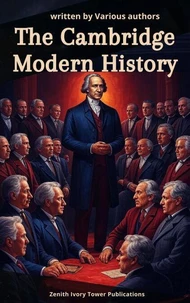THE present volume, as its title imports, relates a complicated series of conflicts of which the origin or the pretext has for the most part to be sought in the great religious schism of Christianity. But the cause of the restoration of Catholic unity in the West was, in the minds of both the supporters and the opponents of that cause, inextricably interwoven with the purposes of dynastic ambition, and powerfully affected by influences traceable to the rapid advance of the monarchical principle and to the gradual growth of the conception of the modern national State.
Although in graver peril than ever before from the persistent advance of the Ottoman Power, Europe no longer finds a real unifying force in either Papacy or Empire. The spiritual ardor of the Catholic Reaction, which might have served to strengthen the resistance to the general enemy of Christendom, is expended largely on internecine conflicts. It allies itself with the settled resolution of Philip of Spain to control the destinies of Western Europe; and thus there is not a phase of the religious and political struggle here described which remains unconnected with the rest.
The Religious Wars of France, with an account of which this volume opens, furnish the most complete instance of the constant intersection of native and foreign influences; but it is illustrated by almost every portion of the narrative. Since, therefore, the story of no European country or group of countries in this troubled period admits of being told as detached from the contemporary history of its neighbors, allies, or adversaries, the same series of events must necessarily appear more than once in these pages as forming an organic part of the history of several countries, but treated in each case from a distinct point of view...
THE present volume, as its title imports, relates a complicated series of conflicts of which the origin or the pretext has for the most part to be sought in the great religious schism of Christianity. But the cause of the restoration of Catholic unity in the West was, in the minds of both the supporters and the opponents of that cause, inextricably interwoven with the purposes of dynastic ambition, and powerfully affected by influences traceable to the rapid advance of the monarchical principle and to the gradual growth of the conception of the modern national State.
Although in graver peril than ever before from the persistent advance of the Ottoman Power, Europe no longer finds a real unifying force in either Papacy or Empire. The spiritual ardor of the Catholic Reaction, which might have served to strengthen the resistance to the general enemy of Christendom, is expended largely on internecine conflicts. It allies itself with the settled resolution of Philip of Spain to control the destinies of Western Europe; and thus there is not a phase of the religious and political struggle here described which remains unconnected with the rest.
The Religious Wars of France, with an account of which this volume opens, furnish the most complete instance of the constant intersection of native and foreign influences; but it is illustrated by almost every portion of the narrative. Since, therefore, the story of no European country or group of countries in this troubled period admits of being told as detached from the contemporary history of its neighbors, allies, or adversaries, the same series of events must necessarily appear more than once in these pages as forming an organic part of the history of several countries, but treated in each case from a distinct point of view...

 , qui est-ce ?
, qui est-ce ?